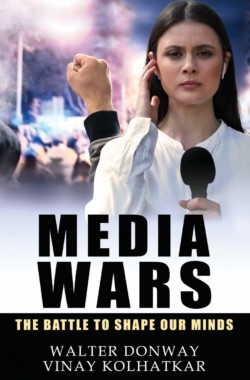The Imposter (fiction)
“A stamp of approval, not his own. He can find no joy in the struggle and no joy when he has succeeded. He can’t say about a single thing: ‘This is what I wanted because I wanted it, not because it made my neighbors gape at me.’” Ayn Rand on the soul of the second-hander.
Dr. Rohan Joshy lit a pipe because he had a meeting with Olivia Allen.
A psychologist and an academic researcher, Rohan was in his early forties, of medium height and slim build, with a compassionate face.
Occasionally, some of his research clients wanted therapy sessions. If they met him at his university office, it would disguise the personal session as one between a professional and a business client. This suited some patients. It worked especially well if the patient was a celebrity. Scandal lurked in the shadows for celebrities—what if the media found out a celebrity visited a clinical psychologist?
Seated in his office at George Washington University that day, Rohan was concerned. He had had famous clients before: federal court judges, company presidents, high-profile artists. In fact, low-profile clients could hardly afford his fee of $300 an hour.
This, though, was slightly different. He was sure his diagnosis of Olivia Allen was correct, in that she had Imposter Syndrome. It wasn’t difficult to get her conscious mind to accept it. Getting her subconscious to overcome it—and that was the only way to eventually overcome it—was proving difficult.
He needed to think hard about what would get Olivia over the line. Many with this syndrome never did. Olivia, however, was getting increasingly powerful and more successful in her professional life, and as is the case with people with Imposter Syndrome, her confidence actually fell with each success; her fear actually rose with each milestone. Unmanaged, this was driving her toward a complete nervous breakdown. Dr. Joshy didn’t have a way of stopping it, not yet anyway. Tobacco helped him think, it helped him concentrate. So although he never smoked cigarettes, he let himself partake of a pipe, just once in a while, when he needed to concentrate.
Today was one of those days.
Olivia was going to be traveling for a political campaign. This meant she would not have regular sessions. It meant speaking engagements, fundraisers. Applause. Attention. Fear. Medication. The cycle had to be broken.
So lost in his thought was he that he barely noticed Olivia walking in, closing the door behind her, taking her position on the reclining couch, smiling at him, and waiting for him to break the ice.
Reclining couches had long gone out of fashion; therapists preferred to see clients eye to eye, watching their emotions. But Dr. Joshy let his clients choose whatever felt more comfortable to them; sometimes watching the ceiling let them ease up and talk more.
“How’s the day been so far?” Rohan asked.
“Okay, I guess,” she said, gazing at the pale blue wall above her.
“Okay?”
“Yeah, okay.”
“Something more is happening, isn’t it?”
“Yes. Colin Spain wants me to be his vice presidential nominee.”
“What’s wrong with that?”
“Nothing. Nerves, I guess…”
“What else?”
There was no answer. He altered his course.
“What is your deepest desire?”
“To help. To help other people.”
“Like Colin?”
“No, the real people out there.”
“Colin isn’t real?”
“Oh, he is. Only because he wants to help the people out there. So I would like to help him. It’s really bad out there.”
“So you have said yes?”
“No…I mean yes, but I’m not sure he even heard me. I could still retract. And Iowa. I had agreed to Iowa. But that’s done now.”
“That was the first leg of the campaign, right?”
“It was. He won. That’s all I had agreed to. But my country needs me.”
“The way you say it…like it’s only a matter of time before you accept the whole lot…”
“Unless he fails at New Hampshire…”
“Which he…”
“That’s right, which he won’t because he is too darn good at this.”
“What would your mother say if she was alive today?”
“I don’t know.”
“Picture it. Picture yourself talking to your mother. Like she is in this room right now. You have just told her…that the front-runner has invited you to—”
Olivia did not even let him finish the sentence.
“Olivia, that’s wonderful. That’s my girl. Now say yes, of course. Maybe this can result in a vice presidency. My Olivia, the vice president. You know, this country missed out on a woman president because, in 2004, Hillary didn’t run.”
“What if you lose? Will she still like you?”
“I guess so. I was always first at school. That made her happy. But at U Penn, the first time when I did not top my class…”
Olivia sniffed and wiped her eyes.
“What do you want to say to your mother?”
“Mom, please. Please stop being a tiger mom. Why can’t I be like everyone else? She would say it is because you are gifted. Because you are destined, she would say. Destined to excel. Destined to be at the top. She was so disappointed when I married Gary. Even though he was a very successful architect then…if she saw him now…sitting at home…frustrated at the way his work is going…or not going.”
“Did you ever talk back to her?”
“I can’t remember. Certainly more often to Dad.”
“No Dad for now. Although we have to deal with him too. He is at Greenview Retirement, isn’t he?”
“He is.”
“Same exercise for next week,” he said near the end of the session.
“But I will be out on the road.”
“I know. But you will be staying in a hotel. In your own room. It should make it easier, in fact. Keep doing the exercise as before. Every evening, before you go to bed, say to your mother what you would rather have done all those times you felt pressured to do what you thought her expectations were. Spend at least five minutes doing this, each night.”
“I don’t even know what to say.”
“I know. Even if it is the same as what you actually did anyway, say it. Say it to the person in the mirror.”
Olivia nodded. She sat up on the couch and turned toward the mirror in the room, as if to face her demons.
“Mom, I am scared.”
Behind her, Dr. Joshy softly said, “Of what?”
“Of so many things. But mainly, I am scared that one day I will get found out.”
“What did you do so wrong?”
“Nothing really. I should be grateful and happy. I have a wonderful, devoted husband. Two wonderful children. But…but I am scared.”
“Of what, dear?”
“Of being found out. I don’t deserve all this…all this success. I don’t ever feel up to it. It’s like I don’t…I don’t belong in this league, this league of high achievers, of high self-esteem, of confidence, of ability. I am just a fluke.”
“You are not a fluke, Olivia.”
“Yes, I am.”
“Weighted GPA scores over four, college debating team, an accomplished violinist with degrees in political science and law. An excellent mother and a loving wife. That’s you. Hardly a fluke.”
“No, that’s the…the person in the mirror…that’s what the world sees. It’s not how I feel. I feel…I feel inadequate.”
“Do Georgia and Natasha love you?”
“Yes.”
“And you are a good mother? They are not spoiled?”
“I guess so.”
“Do you fight hard? Hard for the things you believe in? Like the education reform bill, the veterans’ care bill?”
“Yes, I fought hard on those issues.”
“You are a good person, Olivia.”
“I believe that,” she said.
“Good. And you know you don’t need to be a high flier to be a good person.”
“Mom would never say that. I have gifts. I must use them. Use them to the utmost. Oh god!”
Olivia’s face cracked open like a dam with a hole in it. She was breaking down, her voice slipping. The more this happened, the more Dr. Joshy looked satisfied.
Then suddenly, as quickly and mysteriously as she had cracked, she composed herself. She was once again a high-ranking senator of the United States of America, off on a presidential campaign trail.
Dr. Joshy didn’t get any further for the rest of the session.
Later that day, Olivia attended a function at a retirement village just outside Arlington. She sat around for hours with the senior citizens and the resident doctors and nurses, listening to their worries and their problems, making no promises other than “I’ll do what I can.”
Katrina Marshella, of course, had known that Olivia was coming and made sure that some press corps were around. The photo op was brilliant, but Olivia was genuine, even making notes in her notebook as she buzzed around.
The next day, Olivia was at George Mason University addressing a student antiwar rally in the university lecture hall.
“We need military bases overseas,” she said, “because they protect us from terrorism on home soil. But it is important that we do not become invaders or even begin to be perceived as invaders. You might say it’s too late for that. We are already perceived as invaders.
“That is the fault of the current administration. We are in Bahrain and Qatar and Israel and Brazil at their request. We went back into Saudi Arabia in 2017 at their request. What Colin Spain wants is for these bases to contain forces of the host country and our own so it is no longer seen as an exclusive American force.
“Terrorism did not happen overnight. It was brewing for years…for decades maybe. And it will not go away overnight. But Colin Spain is committed to establishing a government in Syria that will protect the basic human rights of the Syrian people, particularly of the Syrian women, and then making a speedy withdrawal of all our forces. We are neither hawks nor doves. Those labels frankly do not mean much anymore.
“Pakistan is a more complex issue. And, of course, we are opposed to any new involvements, such as Iran, which the Young administration has got almost inexorably involved in and that Vice President Kirby has flirted with.
“It’s a strong and safe America that will be a beacon of hope and freedom around the world.”
Olivia appeared strong and resolute. Her “War and Freedom” address was reported in a good light all around the nation, and she went home to yet another anxiety attack, suffered in the complete privacy of her study.
The excerpt above is a book chapter from the novel “The Frankenstein Candidate: A Woman Awakens to a Web of Deceit.”
 Caltech, which runs workshops for students on imposter syndrome, defines it thus, “Impostor syndrome can be defined as a collection of feelings of inadequacy that persist even in face of information that indicates that the opposite is true. It is experienced internally as chronic self-doubt, and feelings of intellectual fraudulence.”
Caltech, which runs workshops for students on imposter syndrome, defines it thus, “Impostor syndrome can be defined as a collection of feelings of inadequacy that persist even in face of information that indicates that the opposite is true. It is experienced internally as chronic self-doubt, and feelings of intellectual fraudulence.”
Dr. Valerie Young, author of The Secret Thoughts of Successful Women, even has a dedicated site called—would you believe it—www.impostersyndrome.com, where she says, “While the impostor syndrome is not unique to women, they are more likely to agonize over tiny mistakes and blame themselves for failure, see even constructive criticism as evidence of their shortcomings; and chalk up their accomplishments to luck rather than skill.”
The American Psychological Association asserts that “The impostor phenomenon and perfectionism often go hand in hand. So-called impostors think every task they tackle has to be done perfectly, and they rarely ask for help.”
“You think, ‘Why would anyone want to see me again in a movie? And I don’t know how to act anyway, so why am I doing this?’” Meryl Streep
Claire Cohen, Deputy Women’s Editor at The Telegraph (U.K.), suggested as recently as November 16, 2015 that it is a familiar feeling among high-achieving women.
Do you agree? Do you have, or do you know someone who has such feelings?
« To the Paris Victims Spotlight on our Freedom—to Question even the “Sacred” »










